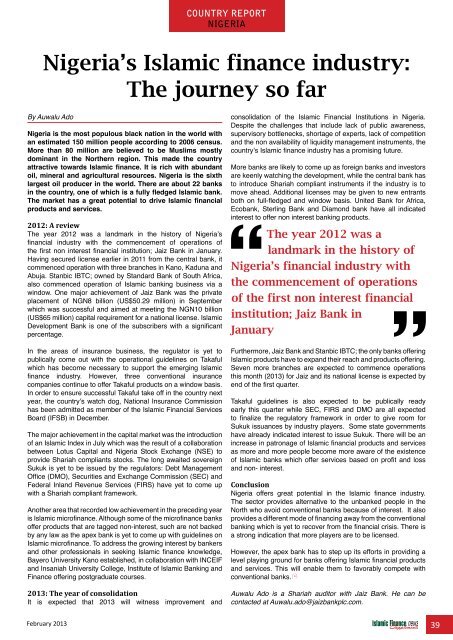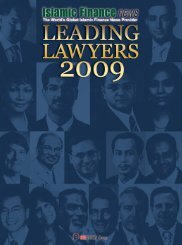View PDF Edition - Islamic Finance News
View PDF Edition - Islamic Finance News
View PDF Edition - Islamic Finance News
You also want an ePaper? Increase the reach of your titles
YUMPU automatically turns print PDFs into web optimized ePapers that Google loves.
country report<br />
nigeria<br />
Nigeria’s <strong>Islamic</strong> finance industry:<br />
The journey so far<br />
By Auwalu Ado<br />
Nigeria is the most populous black nation in the world with<br />
an estimated 150 million people according to 2006 census.<br />
More than 80 million are believed to be Muslims mostly<br />
dominant in the Northern region. This made the country<br />
attractive towards <strong>Islamic</strong> finance. It is rich with abundant<br />
oil, mineral and agricultural resources. Nigeria is the sixth<br />
largest oil producer in the world. There are about 22 banks<br />
in the country, one of which is a fully fledged <strong>Islamic</strong> bank.<br />
The market has a great potential to drive <strong>Islamic</strong> financial<br />
products and services.<br />
2012: A review<br />
The year 2012 was a landmark in the history of Nigeria’s<br />
financial industry with the commencement of operations of<br />
the first non interest financial institution; Jaiz Bank in January.<br />
Having secured license earlier in 2011 from the central bank, it<br />
commenced operation with three branches in Kano, Kaduna and<br />
Abuja. Stanbic IBTC; owned by Standard Bank of South Africa,<br />
also commenced operation of <strong>Islamic</strong> banking business via a<br />
window. One major achievement of Jaiz Bank was the private<br />
placement of NGN8 billion (US$50.29 million) in September<br />
which was successful and aimed at meeting the NGN10 billion<br />
(US$65 million) capital requirement for a national license. <strong>Islamic</strong><br />
Development Bank is one of the subscribers with a significant<br />
percentage.<br />
In the areas of insurance business, the regulator is yet to<br />
publically come out with the operational guidelines on Takaful<br />
which has become necessary to support the emerging <strong>Islamic</strong><br />
finance industry. However, three conventional insurance<br />
companies continue to offer Takaful products on a window basis.<br />
In order to ensure successful Takaful take off in the country next<br />
year, the country’s watch dog, National Insurance Commission<br />
has been admitted as member of the <strong>Islamic</strong> Financial Services<br />
Board (IFSB) in December.<br />
The major achievement in the capital market was the introduction<br />
of an <strong>Islamic</strong> Index in July which was the result of a collaboration<br />
between Lotus Capital and Nigeria Stock Exchange (NSE) to<br />
provide Shariah compliants stocks. The long awaited sovereign<br />
Sukuk is yet to be issued by the regulators: Debt Management<br />
Office (DMO), Securities and Exchange Commission (SEC) and<br />
Federal Inland Revenue Services (FIRS) have yet to come up<br />
with a Shariah compliant framework.<br />
Another area that recorded low achievement in the preceding year<br />
is <strong>Islamic</strong> microfinance. Although some of the microfinance banks<br />
offer products that are tagged non-interest, such are not backed<br />
by any law as the apex bank is yet to come up with guidelines on<br />
<strong>Islamic</strong> microfinance. To address the growing interest by bankers<br />
and other professionals in seeking <strong>Islamic</strong> finance knowledge,<br />
Bayero University Kano established, in collaboration with INCEIF<br />
and Insaniah University College, Institute of <strong>Islamic</strong> Banking and<br />
<strong>Finance</strong> offering postgraduate courses.<br />
2013: The year of consolidation<br />
It is expected that 2013 will witness improvement and<br />
consolidation of the <strong>Islamic</strong> Financial Institutions in Nigeria.<br />
Despite the challenges that include lack of public awareness,<br />
supervisory bottlenecks, shortage of experts, lack of competition<br />
and the non availability of liquidity management instruments, the<br />
country’s <strong>Islamic</strong> finance industry has a promising future.<br />
More banks are likely to come up as foreign banks and investors<br />
are keenly watching the development, while the central bank has<br />
to introduce Shariah compliant instruments if the industry is to<br />
move ahead. Additional licenses may be given to new entrants<br />
both on full-fledged and window basis. United Bank for Africa,<br />
Ecobank, Sterling Bank and Diamond bank have all indicated<br />
interest to offer non interest banking products.<br />
The year 2012 was a<br />
landmark in the history of<br />
Nigeria’s financial industry with<br />
the commencement of operations<br />
of the first non interest financial<br />
institution; Jaiz Bank in<br />
January<br />
Furthermore, Jaiz Bank and Stanbic IBTC; the only banks offering<br />
<strong>Islamic</strong> products have to expand their reach and products offering.<br />
Seven more branches are expected to commence operations<br />
this month (2013) for Jaiz and its national license is expected by<br />
end of the first quarter.<br />
Takaful guidelines is also expected to be publically ready<br />
early this quarter while SEC, FIRS and DMO are all expected<br />
to finalize the regulatory framework in order to give room for<br />
Sukuk issuances by industry players. Some state governments<br />
have already indicated interest to issue Sukuk. There will be an<br />
increase in patronage of <strong>Islamic</strong> financial products and services<br />
as more and more people become more aware of the existence<br />
of <strong>Islamic</strong> banks which offer services based on profit and loss<br />
and non- interest.<br />
Conclusion<br />
Nigeria offers great potential in the <strong>Islamic</strong> finance industry.<br />
The sector provides alternative to the unbanked people in the<br />
North who avoid conventional banks because of interest. It also<br />
provides a different mode of financing away from the conventional<br />
banking which is yet to recover from the financial crisis. There is<br />
a strong indication that more players are to be licensed.<br />
However, the apex bank has to step up its efforts in providing a<br />
level playing ground for banks offering <strong>Islamic</strong> financial products<br />
and services. This will enable them to favorably compete with<br />
consulting www.<strong>Islamic</strong><strong>Finance</strong>Consulting.com<br />
www.<strong>Islamic</strong><strong>Finance</strong>Events.com<br />
conventional banks.<br />
www.<strong>Islamic</strong><strong>Finance</strong><strong>News</strong>.com<br />
www.<strong>Islamic</strong><strong>Finance</strong>Training.com<br />
www.MIFforum.com<br />
www.MIFmonthly.com<br />
www.MIFtraining.com<br />
www.REDmoneyBooks.com<br />
Auwalu Ado is a Shariah auditor with Jaiz Bank. He can be<br />
contacted at Auwalu.ado@jaizbankplc.com.<br />
February 2013 39
















